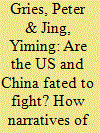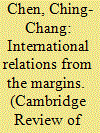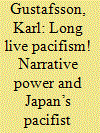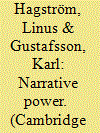|
|
|
Sort Order |
|
|
|
Items / Page
|
|
|
|
|
|
|
| Srl | Item |
| 1 |
ID:
167607


|
|
|
|
|
| Summary/Abstract |
Are the United States (US) and China destined to fall into a ‘Thucydides trap’ of power transitions leading to great power conflict? This study explores how the intersubjective perception of media-disseminated narratives of US–China interdependence may shape the likelihood of war. In two randomized online experiments, we manipulated ordinary Americans’ perceptions of US–China relations with real CNN video clips that narrated a US–China power transition as either positive or zero sum. Across both experiments, more zero-sum narratives boosted perceived US–China competition, increasing intergroup mistrust, anger and subsequent desires for a tougher China policy. The second study also revealed that individual differences in nationalism and uncertainty avoidance moderated the effects of the perception of media narratives on mistrust and anger. Viewers actively interpret media they are exposed to. These findings empirically demonstrate the power of narratives: specifically, they reveal the psychological mechanisms linking structural changes in the balance of power to the individual-level processes that may determine great power war and peace.
|
|
|
|
|
|
|
|
|
|
|
|
|
|
|
|
| 2 |
ID:
167610


|
|
|
|
|
| Summary/Abstract |
This article examines competing narratives over belonging and authority at Japan’s and China’s margins by excavating the discursive practices employed by relevant state and substate actors in framing, contesting and (dis)assembling totalizing claims over Ryukyu/Okinawa and Taiwan since the late nineteenth century. Informed by the critical international relations literature on practices of statecraft and Foucauldian conceptions of power as productive and discursive, we suggest that the aforementioned ‘margins’ are sites central to the constitution, production and maintenance of Chinese and Japanese state identities, which have been repeatedly performed through violent material and discursive practices concealing these two states’ lack of ontological foundation. We look at how the state-centric narratives employed by the Chinese and Japanese authorities have worked to limit, curtail and suppress their locally generated counter-narratives in such cases as the Taiwan Expedition (1874), the Diaoyutai/Senkaku Islands dispute and boundary-making between Okinawa and Taiwan. However, these cases also show that efforts to contain resistance to the state’s inscription of boundaries separating an ‘inside/self/domestic’ from an ‘outside/other/foreign’ cannot fully succeed, not only because where there is power there is resistance but also because the state would wither away should its identity formation be successful in the terms in which it is articulated.
|
|
|
|
|
|
|
|
|
|
|
|
|
|
|
|
| 3 |
ID:
167609


|
|
|
|
|
| Summary/Abstract |
International relations research acknowledges that states can have different security policies but neglects the fact that ‘models’ may exist in the security policy realm. This article suggests that it is useful to think about models, which it argues can become examples for emulation or be undermined through narrative power. It illustrates the argument by analysing Japan’s pacifism—an alternative approach to security policy which failed to become an internationally popular model and, despite serving the country well for many years, has even lost its appeal in Japan. Conventional explanations suggest that Japan’s pacifist policies were ‘abnormal’, and that the Japanese eventually realized this. By contrast, this article argues that narratives undermined Japan’s pacifism by mobilizing deep-seated beliefs about what is realistic and unrealistic in international politics, and launches a counter-narrative that could help make pacifism a more credible model in world politics.
|
|
|
|
|
|
|
|
|
|
|
|
|
|
|
|
| 4 |
ID:
167606


|
|
|
|
|
| Summary/Abstract |
All major theoretical approaches that explain the growing rivalry between the United States (US) and China share a common prediction: as tensions develop, the US and China will each construct a master narrative emphasizing zero-sum interests, the efficacy of coercion, and the perceived blamelessness of the Self for the Other’s aggressions. However, the concrete process by which these narratives emerge has been neither explicitly theorized nor measured in practice. We theorize that in the digital media age, narratives emerge when ‘memes’—discrete, widely circulated images/descriptions of the Self or Other—are connected into coherent stories that eventually coalesce into a master narrative of rivalry. We therefore argue that tracking the speed and spread of memes provides a useful indicator of security dilemma dynamics. To this end, we note that in the United States the US–China rivalry is associated with a prominent meme that describes China as ‘challenging the international rules-based order’ (RBO). We use qualitative and quantitative text analysis, including network and plagiarism analysis, to track the spread of this meme. We provide preliminary evidence that the RBO meme and the ‘revisionist China’ narrative may be crowding out other, less malign narratives about China’s rise.
|
|
|
|
|
|
|
|
|
|
|
|
|
|
|
|
| 5 |
ID:
167605


|
|
|
|
|
| Summary/Abstract |
Scholars debate the ambitions and policies of today’s ‘rising powers’ and the extent to which they are revising or upholding the international status quo. While elements of the relevant literature provide valuable insight, this article argues that the concepts of revisionism and the status quo within mainstream International Relations (IR) have always constituted deeply rooted, autobiographical narratives of a traditionally Western-dominated discipline. As ‘ordering narratives’ of morality and progress, they constrain and organize debate so that revisionism is typically conceived not merely as disruption, but as disruption from the non-West amidst a fundamentally moral Western order that represents civilizational progress. This often makes them inherently problematic and unreliable descriptors of the actors and behaviours they are designed to explain. After exploring the formations and development of these concepts throughout the IR tradition, the analysis is directed towards narratives around the contemporary ‘rise’ of China. Both scholarly and wider political narratives typically tell the story of revisionist challenges China presents to a US/Western-led status quo, promoting unduly binary divisions between the West and non-West, and tensions and suspicions in the international realm. The aim must be to develop a new language and logic that recognize the contingent, autobiographical nature of ‘revisionist’ and ‘status quo’ actors and behaviours.
|
|
|
|
|
|
|
|
|
|
|
|
|
|
|
|
| 6 |
ID:
167604


|
|
|
|
|
| Summary/Abstract |
We are living at a time when people appear to have become more aware of the power of narratives in international politics. Understanding how narratives exercise power is therefore more pertinent than ever. This special issue develops the concept of narrative power for international relations research by focusing on East Asia—the region that has been at the centre of debates about international power shifts since the 1990s. This introduction seeks to elucidate and define four key binary distinctions: (a) narrative power as understood from the perspective of an individualist versus a narrative ontology; (b) narrative power as explanandum versus explanans; (c) narrative power as more prone to continuity or change; and (d) the scholar as a detached observer of narrative power versus the scholar as a narrative entrepreneur and a potential wielder of power. Informed by the individual contributions, the introduction demonstrates how and with what implications research on narrative power can negotiate and traverse these binary distinctions.
|
|
|
|
|
|
|
|
|
|
|
|
|
|
|
|
| 7 |
ID:
167611


|
|
|
|
|
| Summary/Abstract |
Narrative, we argue, can (re)construct social reality. Alternative imaginaries of ‘being in the world’ can lead to alternative ways of ‘doing in the world’. We discuss the current dispute between China and Japan over the Senkaku/Diaoyu Islands as an example. Westphalian logic would have the two countries come to blows, if not go to war, over the Islands. The Westphalian account of the dispute centres on the key principle of sovereignty. But what if we utilized a different imaginary to re-narrate the conflict? We turn to popular culture in both Japan and China as a guide, and juxtapose two anime, Appleseed and Time of Eve, with one Chinese TV drama, Nirvana in Fire. Each of these upends conventional analyses of the Islands dispute and offers alternative conceptions of sovereignty. We conclude by considering the implications of such alternative imaginaries for the study, if not practice, of international relations.
|
|
|
|
|
|
|
|
|
|
|
|
|
|
|
|
| 8 |
ID:
167608


|
|
|
|
|
| Summary/Abstract |
The purpose of this article is to analyse how the seemingly natural fit between Japan and the soft power concept has been possible despite the notorious vagueness of the concept and what the consequences of soft power’s reification are. By building on recent scholarship on concepts, expert knowledge and narratives, the article suggests that reification processes are best conceptualized as driven by concept coalitions. The article finds that soft power was narrated and nurtured into Japan’s cultural diplomacy, Japan’s relationship with the United States (US) and its security policy. The article, moreover, shows that the more soft power was understood, framed and accepted as benign and necessary, the more persuasive arguments about what Japan should do or be in order to wield soft power became. This has legitimized narratives that suggest that Japan’s 'proactive contribution to peace’ as a responsible ally of the US constitutes an inevitable source of soft power.
|
|
|
|
|
|
|
|
|
|
|
|
|
|
|
|
|
|
|
|
|